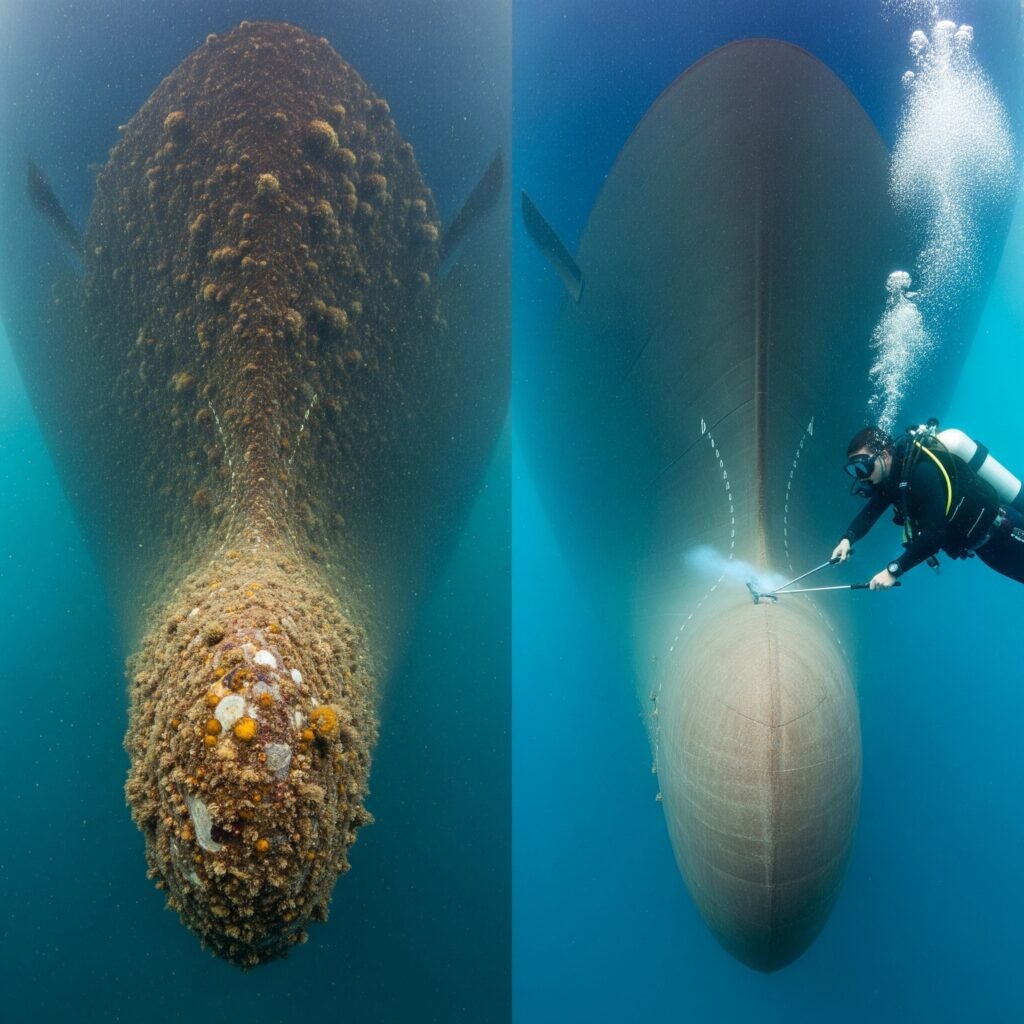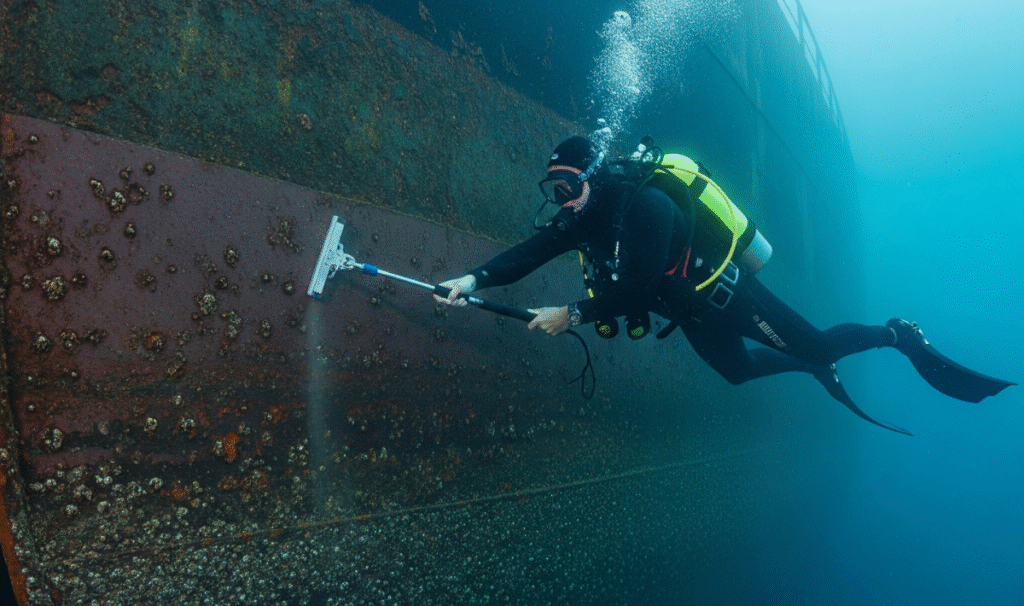Let’s set sail into Ireland’s wild blue, where stately ferries pass through the shadow of ancient castles and fishing trawlers ride the rolling Atlantic. But beneath all that beauty, there’s a lesser-known struggle happening—one that every shipowner, port official, and diver needs to face head-on. Whether you’re a seasoned captain or just curious, understanding the underwater ship hull cleaning in Ireland is crucial for smooth sailing and a clean conscience.
If you’ve ever stood at the rails in Cork or watched ships maneuver in Dublin Bay, you know the ocean here is both breathtaking and untamed. Yet for all the poetry, the seas around Ireland conceal a messy reality—biofouling. It creeps onto hulls, drags down efficiency, and fuels a multi-million euro maintenance industry. That’s where underwater ship hull cleaning in Ireland enters the picture. But before you roll out the brush or deploy the divers, let’s explore those hidden risks that could change everything.
Why Underwater Ship Hull Cleaning in Ireland is Essential—And Risky
What Draws Attention to Irish Maritime Maintenance?
Ireland sits at a maritime crossroads. Vessels here face aggressive fouling due to nutrient-rich waters, heavy trade routes, and dramatic tides. Regular underwater ship hull cleaning in Ireland isn’t just about a pretty hull—it’s about slashing fuel bills, meeting tight schedules, and not getting left in the wake of international compliance.
The Balancing Act: Efficiency Versus Risk
But each choice comes with a shadow. Underwater hull cleaning might promise better speed, but carried out carelessly, it can bring environmental headaches, damage vital coatings, and trigger legal woes. Here’s how these risks play out—and what savvy operators do to avoid them.

Environmental Consequences of Improper Cleaning
Biofouling Debris and Toxic Discharge
Imagine the hull as your ship’s skin. Scraping or jetting off biofouling releases not just bits of weed and barnacle, but flakes of anti-fouling paint. Many of these paints are toxic by design—after all, they’re meant to stop marine hitchhikers. If that debris is left to swirl into Irish ports or wash over coral and kelp beds, the results can be disastrous. This type of pollution is strictly regulated in Ireland, in close partnership with global leaders like the IMO (imo.org) and through MARPOL’s directives (Marine Insight – MARPOL Convention).
Harming Biodiversity & Invasive Threats
Ireland’s unique marine life—from dolphins in Galway Bay to ancient mussel beds—depends on clean, stable habitats. Each unfiltered hull cleaning can spread invasive species, pushing out natives and threatening the entire food web. It’s not just theory: authorities like iaphworldports.org and IMCA point to real-world examples of ecological shifts linked to fouling debris and bio-invasions after poor hull maintenance.
Structural and Operational Hazards
Damage to Coatings and Steel
Think of a hull’s anti-fouling paint as armor. Abrasive, hurried, or improper cleaning can strip away this fancy protection in no time—leaving bare steel at the mercy of saltwater. Corrosion, pitting, and costly repairs often follow. For shipowners in Ireland, every botched clean means shortened dry-dock cycles and a hit to resale value.
Diver and Crew Safety: The Human Element
Let’s not forget those who do the work. Divers operating in Irish waters face challenging conditions—cold, current, murky visibility, and even sudden squalls. Without IMCA-standard protocols and top-tier training, accidents loom. The risk of entanglement, equipment failure, or medical emergencies is real, especially in winter or stormy months when cleaning is hardest and fouling is worst.
Legal, Regulatory, and Financial Exposure
Ireland’s Stringent Environmental Laws and IMO/MARPOL Compliance
Ireland’s environmental rules echo the globe’s toughest, borrowing from the IMO and MARPOL but adding extra teeth. Unauthorized discharge, skipped documentation, or pollution during underwater ship hull cleaning in Ireland can spell real trouble: inspections, fines, or even blacklists for violators.
Potential for Fines, Detentions, and Loss of Reputation
Port state inspectors are vigilant. A poorly documented or improperly handled hull cleaning incident can result in vessel detention, removal from service, and fines that eclipse the cost of good maintenance tenfold. Worse still: news travels fast, and reputation is everything in shipping. Risking shortcuts during underwater ship hull cleaning in Ireland simply isn’t worth it.
Practical Solutions: Navigating the Underwater Ship Hull Cleaning in Ireland
So what’s the smart way forward for Irish shipping?
- Always hire IMCA-certified, experienced teams with a clean safety record.
- Use closed-circuit cleaning tech, which collects and disposes of debris responsibly.
- Plan for regular, proactive cleaning—don’t wait for thick growth.
- Demand full written logs, environmental reports, and before-and-after imagery.
- Stay up to date on evolving Irish and international regulations for underwater ship hull cleaning in Ireland.
For operators seeking trusted expertise, global providers like CleanShip.co are helping vessels in Ireland balance efficiency, compliance, and sustainability—offering IMCA-certified divers, closed-circuit systems, and full documentation tailored to Irish and international standards.
Global Benchmarks: IMCA, IMO, and MARPOL Best Practice
Leading authorities have set high bars. imca-int.com specifies diver safety and operations, imo.org governs contamination and cross-border shipping, and MARPOL (Marine Insight – MARPOL Convention) centers on global anti-pollution rules. Ireland’s maritime agencies partner with these benchmarks and demand proven compliance.

Why Ireland’s Unique Waters Amplify These Risks
From the fierce tidal races of the Irish Sea to the quiet coves of the Shannon, Ireland’s waters are exceptional. Nutrient richness boosts marine life—and marine slime. Storms arrive quickly, swells can be unpredictable, and biodiversity hotspots sit side by side with major shipping lanes. The result? The critical risks of underwater ship hull cleaning in Ireland must be taken seriously if businesses hope to thrive and the seas are to stay blue.
Conclusion
The true cost of careless hull cleaning is hidden beneath the waves—until a fine, a spill, or a tarnished reputation brings it to the surface. Yet, underwater ship hull cleaning in Ireland can be a win-win. By respecting the 3 critical risks, choosing best-in-class service providers, and staying ahead of evolving rules, you’ll save money, gain speed, and help ensure Ireland’s maritime future glimmers for generations to come.
FAQ:
Q1. How often should underwater ship hull cleaning in Ireland take place?
Inspection every six months, with cleaning as soon as biofouling becomes visible or performance drops, is a smart rule for most operators.
Q2. Are robotic cleaning solutions used in Ireland?
Yes, many high-traffic ports use robotic and remote systems for safer, more consistent hull cleaning and documentation.
Q3. Can underwater hull cleaning be done during all seasons in Ireland?
Cleaning can continue year-round, but winter storms and poor visibility in certain months require more planning, an advanced kit, and careful scheduling.
Q4. What authorities regulate underwater ship hull cleaning in Ireland?
Local port authorities, the Department of Transport, and national marine agencies enforce IMO, MARPOL, and local laws for all cleaning crews.
5. How can I ensure my vessel’s cleaning is both effective and compliant?
Work only with IMCA-certified teams, use MARPOL-compliant equipment, require full reporting, and track updates to Irish maritime law.


